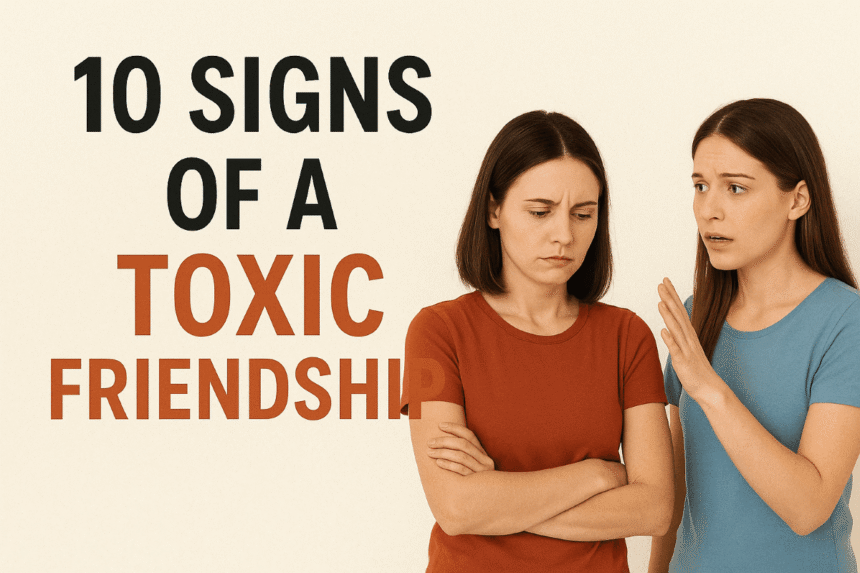Signs of a toxic friendship are often subtle but powerful enough to drain your energy, lower your confidence, and harm your overall well-being. While friendships are meant to bring joy, comfort, and support, not all of them do. Some bonds, despite starting with love and trust, can gradually turn unhealthy. A toxic friendship is one where you consistently feel stressed, unheard, or emotionally exhausted. Recognising these patterns is essential because staying in such relationships can damage your mental health and keep you from building healthier connections.
In this article, we’ll explore the clear signs of a toxic friendship, why they matter, and how you can step away from unhealthy bonds with grace and dignity.
Why Recognising Toxic Friendships Matters
Friendship is often called one of the greatest gifts of life. A supportive friend encourages you in tough times, celebrates your achievements, and respects your individuality. But the opposite can also be true—some friendships turn into emotional traps.
Psychologists warn that toxic friendships can cause emotional fatigue, increased anxiety, and even physical health issues like headaches, sleep problems, and lowered immunity. Just like we identify unhealthy food habits or toxic work environments, it’s equally important to evaluate friendships. Knowing the signs of a toxic friendship gives you the power to choose healthier relationships and protect your peace of mind.
10 Clear Signs of a Toxic Friendship
1. You Feel Emotionally Drained After Spending Time with Them
A true friend energises you, but a toxic friend leaves you feeling tired and empty. For example, after an hour-long conversation, instead of feeling connected, you feel stressed or sad. This constant emotional drain is a red flag. Experts call this emotional exhaustion, and if it happens repeatedly, it can lead to burnout.
Tip: Notice how you feel after interactions. If you regularly feel worse rather than better, the friendship may be harming you.
2. The Relationship Feels One-Sided
Healthy friendships involve mutual give and take. In a toxic bond, however, you may find yourself always making the effort—calling, apologising, and supporting—while the other person remains indifferent. This imbalance is often a form of emotional exploitation.
Example: You comfort your friend during their hard times, but when you need support, they disappear or dismiss your feelings.
Tip: Step back and see if the effort is mutual. If not, it’s a strong sign that the friendship is unhealthy.
3. They Disregard Your Values and Make Fun of You
A true friend respects your beliefs, values, and life choices even if they differ. A toxic friend, however, constantly mocks your opinions, belittles your dreams, or makes sarcastic remarks about your principles. Psychologists call this value dissonance—where your core values clash with theirs in a harmful way.
Example: You may share an exciting plan about your career, and instead of support, your friend laughs and says, “That’s impossible for you.”
Tip: Respect is the foundation of any healthy relationship. If your values are repeatedly dismissed, it’s time to rethink the bond.
4. They Never Change, but You’re Always the One Forgiving
Forgiveness is important in any relationship. But in a toxic friendship, you may notice a pattern: you keep forgiving, while the other person keeps repeating the same hurtful behaviour without change or apology.
Example: A friend constantly cancels plans at the last minute and never acknowledges the inconvenience. You forgive, but the cycle repeats endlessly.
Tip: Forgiveness without change leads to resentment. Pay attention to actions, not just words.
5. You Feel Fear or Anxiety Before Meeting Them
Friendship should bring comfort, not dread. If you feel nervous or tense before meeting your friend—or hesitate to answer their calls—it’s a sign that the relationship has become emotionally unsafe.
Example: Your heart races when you see their name pop up on your phone because you expect criticism or conflict.
Tip: Your body often recognizes toxicity before your mind does. Trust those physical signals.
6. They Are Overly Negative
Everyone has bad days, but toxic friends bring constant negativity into your life. They may complain, gossip, or always expect the worst. Over time, this negativity seeps into your own mindset.
Example: You share good news, and instead of being happy for you, they point out potential problems or minimize your success.
Tip: Protect your mental space by limiting exposure to constant negativity.
7. They Compete Instead of Celebrate
Healthy friends cheer for each other’s achievements. Toxic friends, however, feel threatened and turn everything into a competition. Instead of celebrating, they try to outshine or belittle you.
Example: You share that you got a promotion, and instead of congratulating you, your friend replies, “That’s nothing, wait till you see my next achievement.”
Tip: Notice whether your friend genuinely celebrates your wins or secretly resents them.
8. You Can’t Be Your Authentic Self
In a toxic friendship, you may feel you need to filter your words, hide your feelings, or pretend to be someone else to avoid criticism. Over time, this erodes your confidence and identity.
Tip: A true friend accepts the real you. If you feel judged or silenced, the friendship may not be healthy.
9. They Break Your Trust
Trust is the heart of friendship. If your friend gossips about you, breaks promises, or shares your secrets, it’s a clear violation of trust. Once broken, trust is hard to rebuild, and continuing such a friendship may bring more pain than peace.
10. You Feel Stuck, Not Growing
Friendships should help you grow, learn, and evolve. But in toxic friendships, you often feel stuck, unmotivated, or held back. Instead of inspiring you, your friend discourages your progress.
Example: They dismiss your plans to improve your career, saying, “Why bother? You’ll never succeed.”
Tip: Surround yourself with friends who lift you higher, not those who hold you down.

How to End a Toxic Friendship Gracefully?
Ending a friendship is never easy, especially if it has been part of your life for years. But holding on to toxicity does more harm than good. Here are some gentle ways to step away:
- Be Honest, But Kind: Express your feelings calmly instead of blaming.
- Set Boundaries: Reduce communication gradually if a direct conversation feels too difficult.
- Prioritise Self-Care: Remember that your mental health is more important than keeping someone who hurts you.
- Replace with Healthy Bonds: Invest your time in friends who genuinely care and support you.
Conclusion
Friendships should brighten your life, not drain it. Recognising the signs of a toxic friendship helps you protect your mental health and emotional balance. While it’s painful to let go, sometimes ending a friendship is an act of self-respect and self-care. Remember, not every person is meant to stay forever—some are only companions for a part of your journey. By letting go of toxic bonds, you make space for healthier, more fulfilling relationships.
Do you feel you might be experiencing any of these signs of a toxic friendship in your own life?
FAQs on Signs of a Toxic Friendship
1. What are the most common signs of a toxic friendship?
The most common signs include constant negativity, emotional exhaustion, one-sided effort, lack of trust, and feeling unsafe or judged.
2. Can a toxic friendship be fixed?
Sometimes, yes. If both people are willing to change and communicate openly, improvement is possible. But if the toxic behaviour continues, walking away may be the healthier choice.
3. Is it selfish to end a friendship?
No. Prioritising your mental health is an act of self-care, not selfishness. Ending toxic friendships allows you to build healthier relationships.
4. How do I end a friendship without hurting the other person?
Be honest but respectful. Explain your feelings calmly, avoid blame, and set boundaries with compassion.
5. Why do toxic friendships feel so hard to leave?
Toxic friendships often come with emotional history and attachment. However, holding on to unhealthy bonds prevents personal growth and peace of mind.
Thank you for taking the time to explore this post. I hope you found it both insightful and enjoyable.
Remember, your sharing can make a positive impact! Please share this post across your social media and other networks, allowing others to benefit from its content.
PVM

Mathukutty P. V. is the founder of Simply Life Tips, a blogger, content writer, influencer, and YouTuber passionate about learning and sharing. Guided by “Simple Living, Creative Thinking,” he believes in the power of knowledge sharing and lifelong learning.






